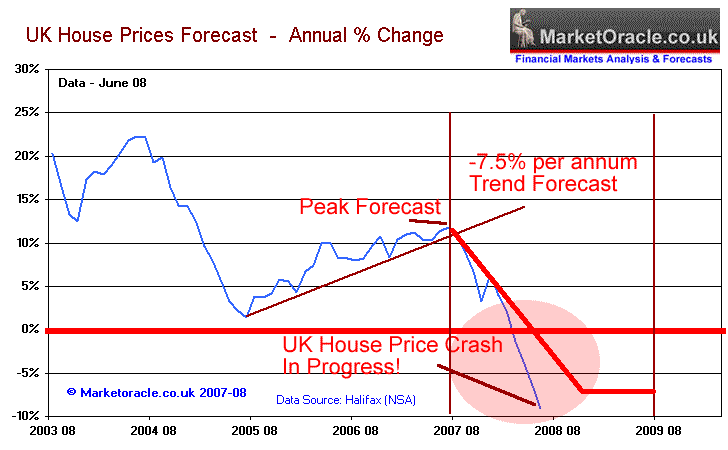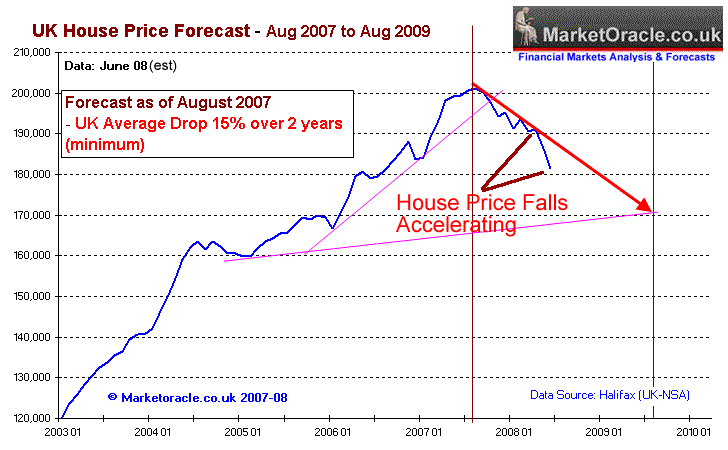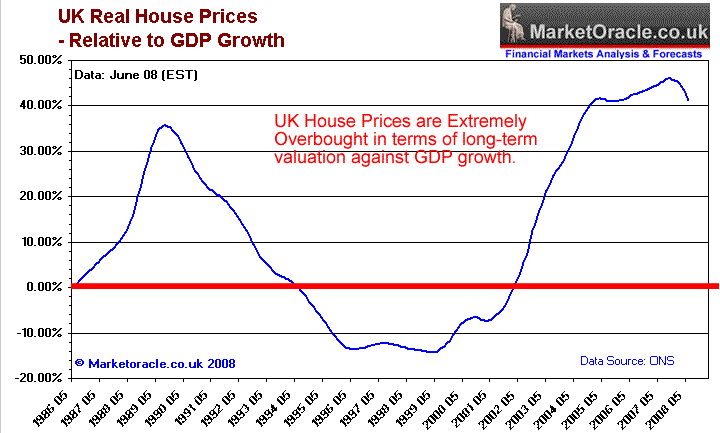UK House Price Crash In Progress!
Housing-Market / UK Housing Jul 11, 2008 - 05:23 AM GMTBy: Nadeem_Walayat

 The Halifax house price data for June revealed a 2% fall in house prices for the month or a loss of value of £3,500 from May, house prices are now down 6.1% on an seasonally adjusted basis, which is a far cry from March 2008 when the bank's chief economist was painting a bullish picture for house prices. However the housing market is in CRASH mode for the quarter April to June 08, as forecast by the Market Oracle in November 2007 -
"house prices could register a drop of as much as 5% in the quarter April 08 to June 08"
The Halifax house price data for June revealed a 2% fall in house prices for the month or a loss of value of £3,500 from May, house prices are now down 6.1% on an seasonally adjusted basis, which is a far cry from March 2008 when the bank's chief economist was painting a bullish picture for house prices. However the housing market is in CRASH mode for the quarter April to June 08, as forecast by the Market Oracle in November 2007 -
"house prices could register a drop of as much as 5% in the quarter April 08 to June 08"
The Halifax still appears to be in a state of denial as to the weakness of the UK housing market by still issuing statements such as "The housing market continues to be underpinned by sound fundamentals.", with the Chief Economist, Martin Ellis, continuing to clutch at straws by trying to talk the market higher.
"House prices have declined by 6.1% over the past year. Nonetheless, the average UK price remains slightly higher than two years' ago and is appreciably stronger than three or four years ago.
House prices fell by 2.0% in June compared to 2.5% in May, a slight moderation in the recent rate of decline."
This is entirely predictable in that vested interests in a stable / rising housing market will not acknowledge the seriousness of the state of the housing bear market as which transpired during the 1988 to 1994 housing bear market and warned of in the analysis of Sept 2007 - UK Housing Market on Brink of Price Crash - Media Lessons from 1989!
Martin Ellis's statement that house prices have declined by 6.1% over the past year fails to mask the fact that UK house prices ARE CRASHING!, my original forecast for a crash of 5% in the quarter April 2008 to June 2008 has been exceeded as house prices have fallen by 5.8%! So 5.8% of the 6.1% annualised decline has occurred in just the past 3 months!
Whilst the data released to date is of the seasonally adjusted variety, and I am still awaiting release of the non seasonally adjusted data which has been my preferred measure for tracking house prices for the past 20 years as being far more significant in juncture recognition analysis than the more manipulated seasonally adjusted prices which tends to generate false readings for a period of time to be followed by sharp movements as we are now witnessing in the house price's indices that are being treated by the industry in terms of surprise as an out of the blue event, when in actual fact the trend has been in force following the peak of August 2007 as originally forecast in August 2007 - UK Housing Market Crash of 2007 - 2008 and Steps to Protect Your Wealth. I am therefore in the meantime estimating the non seasonally adjusted June house price data to be for a smaller decline of 1.7% against the 2% announced which puts house prices as having fallen by 9% from the August 2007 peak or nearly £20,000.
Negative house price inflation is impacting hard on the housing market linked sectors such as the house builders which has seen 5000 workers laid off just over the last week with another 7,000 anticipated to be made redundant in the coming week as the housing market activity plunges. freezing inline with the distress observed amongst the mortgage banks which saw Bradford and Bingley teetering on the brink of collapse earlier this week that was only prevented from a Northern Rock style collapse by the stepping in of major UK banks to sub-underwrite the rights issue and thereby putting a floor under the share price thus agreeing to finance a liquidity injection of as much as £400 million.
The housing bear market is approaching its first anniversary in August 2008, and in preparation of which I am seeking to extend the existing housing market forecast for a 15% fall from August 2007 to August 2009, by way of extensive analysis that will carry the trend well into 2011. In the meantime the following housing market graphs give a flavor of the ongoing crash and how far house prices have the potential to fall before any talk of a bottom can be taken seriously.



By Nadeem Walayat
http://www.marketoracle.co.uk
Copyright © 2005-08 Marketoracle.co.uk (Market Oracle Ltd). All rights reserved.
Nadeem Walayat has over 20 years experience of trading, analysing and forecasting the financial markets, including one of few who both anticipated and Beat the 1987 Crash. Nadeem is the Editor of The Market Oracle, a FREE Daily Financial Markets Analysis & Forecasting online publication. We present in-depth analysis from over 150 experienced analysts on a range of views of the probable direction of the financial markets. Thus enabling our readers to arrive at an informed opinion on future market direction. http://www.marketoracle.co.uk
Disclaimer: The above is a matter of opinion provided for general information purposes only and is not intended as investment advice. Information and analysis above are derived from sources and utilising methods believed to be reliable, but we cannot accept responsibility for any trading losses you may incur as a result of this analysis. Individuals should consult with their personal financial advisors before engaging in any trading activities.
Attention Editors and Publishers! - You have permission to republish THIS article. Republished articles must include attribution to the author and links back to the http://www.marketoracle.co.uk . Please send an email to republish@marketoracle.co.uk, to include a link to the published article.
Nadeem Walayat Archive |
© 2005-2022 http://www.MarketOracle.co.uk - The Market Oracle is a FREE Daily Financial Markets Analysis & Forecasting online publication.
Comments
|
IA
11 Jul 08, 12:39 |
UK Housing Market - Best Strategy?
Nadeem,
I have been reading your UK House market analysis on marketoracle.co.uk with great interest. I agree with you the housing market is undergoing a 'crash' at this moment, and the current average house prices (£180,000) has scope to fall by another £20,000 even before bottoming out. I wanted to gain your views on the best strategy in this situation.
I see my predicament as the epimity of the current situation. I brought for £185,000 in March 2008 (3 bed house in Milton Keynes) and the current marrket valuation is £179,995. I believe the valuation has scope to fall to £170,000 by end of the year with a similar decline next year.
I put down a cushion of a £25,000 deposit, but have already lost £5,000 on the decline in the value of the house. There is a further combined loss of the fees and improvements to the house of £10,000 on top. However with the average house price potentially crashing to £170,000-160,000 by this time next year (leading to a total paper loss of £35,000), would the best strategy be to sell now?
The bank where I work is going offshoring programme and there is a strong possibility this will affect my job next year. My intention was to sell the house and move this time next year due to requirement to find new work, probably in London. I don't see any way to remain in the current house for much longer than 1 year owing to the work situation and lack of suitable employment within a reasonable travelling distance. Season ticket for travelling from MK to London cost's £5-6,000 a year in any case.
I believe selling now may minimise the effects of further house price devaluation (to my current £15,000 loss) and also save on mortage outgoings by renting for the next 1-2 years (net gain up to £10,000). With the market bottoming out maybe by end 2009, 2010 may be the time to venture into the market again, probably in London.
Your views would be much appreciated to try make sense of the best strategy in these troubling times. |
|
Nadeem_Walayat
11 Jul 08, 20:23 |
UK House Prices
Hi I think the mistake that you have made here, is to buy the property as a short-term investment for just 1 year rather than as a home to live in for many years. As you agree with the opinion that house prices are destined to continue falling for sometime therefore your ‘investment' will lose money both in nominal terms and also in real terms as inflation during the next 12 months is destined to average at least 4.5% in RPI terms, therefore a forecast house price drop of 7.5% plus 4.5% suggests a real terms loss of value of 12%. Without giving you specific advice you on your current predicament, what I will say is that when I am Investing in an asset for example shares, I always have a stop-loss level on which to liquidate the investment, as the minimum requirement for any investment is for it to hold its value against inflation, if it fails to do so then your money is better off being in a bank savings account rather than be invested. My view is that the housing market will continue falling in real-terms for many years, i.e. on adjusting for inflation, perhaps for as long as another 8 years before there is a real –terms bottom, rather than a nominal bottom which would occur earlier. This will have the effect of making buyers increasingly reluctant to buy for investment, unless their primary focus is to buy the property for as a home rather than any serious investment potential. The following article analysis the gain / loss of renting or investing in property during a bear market. http://www.marketoracle.co.uk/Article5296.html NW. Disclaimer: The above is a matter of opinion provided for general information purposes only and is not intended as investment advice. Information and analysis above are derived from sources and utilising methods believed to be reliable, but we cannot accept responsibility for any trading losses you may incur as a result of this analysis. Individuals should consult with their personal financial advisors before engaging in any trading activities. |
|
Sam
11 Jul 08, 20:42 |
Housing Crash ?
How can a 2% drop over a month or a 6% fall over 3 months be a crash ? A crash happens in one day such as the stock market crash, the housing market cannot crash ! |
|
Nadeem_Walayat
11 Jul 08, 20:54 |
UK House Price Crash Datapoints
Hi Sam The housing market moves far slowly than the stock market, ignoring tick pricing, the stock market is priced by the minute, therefore a trading day of 7.5 hours can have 450 datapoints over which to complete a move, whereas the housing market data is released on a monthly basis and therefore there exists only 1 data point per month. On its own a single data point is not significant, however the UK housing market has been in a downtrend for 10 datapoints where the last 3 datapoints have seen a fall of 6.1%, which extrapolates into an annualised rate of decent of 24.4%. This rate of decent can be labeled as a CRASH in progress as a housing bear market ranges from an annualised rate of between 10% to a gain of less than the rate of inflation as house prices that fail to keep pace with inflation are still technically in a real-terms bear market, which can result in a greater loss of value than the original price fall. The following article illustrates the impact of inflation on real terms house price trends http://www.marketoracle.co.uk/Article5033.html Back to the current situation, an annualised rate of decline of 24.4% is a market that is in a crash mode. This has near immediate effect on sectors linked to the housing market as we are witnessing with the building, and mortgage banks sectors as well as estate agencies. NW. Disclaimer: The above is a matter of opinion provided for general information purposes only and is not intended as investment advice. Information and analysis above are derived from sources and utilising methods believed to be reliable, but we cannot accept responsibility for any trading losses you may incur as a result of this analysis. Individuals should consult with their personal financial advisors before engaging in any trading activities. |
|
Ron L.
12 Jul 08, 08:18 |
house price gains
houses gained 200% in many cases so a fall of 9% is not significant. Only those who bought during 2007 could be looking at a loss the vaste majority are sitting on huge gains, this is just scaremongering! Ron. |
|
Nadeem_Walayat
12 Jul 08, 09:23 |
Falling House Prices
A 9% fall from the highs against a 200% gain represents a loss of 27% against the initial purchase. Remember that a loss from a high is from a much larger number than the gain from a low. I.e. 100,000 plus 200% = 300000 27000 of original £100k = 27% Also inflation erodes the real-terms value of the gain in house prices i.e. 300,000 peak value for a gain over 5 years would equal a real-terms gain of - 300000 less inflation X 3.5% per annum average (RPI) 251000 real gain at peak 151% At the same pace of declines in another year real-terms gains will have fallen to 78%. With house prices down 25% in real-terms from the peak on an inflation basis of 4.5% per annum (RPI) NW. Disclaimer: The above is a matter of opinion provided for general information purposes only and is not intended as investment advice. Information and analysis above are derived from sources and utilising methods believed to be reliable, but we cannot accept responsibility for any trading losses you may incur as a result of this analysis. Individuals should consult with their personal financial advisors before engaging in any trading activities. |
|
Allan MacKenzie
25 Oct 08, 14:08 |
Sell home then rent?
Nadeem, I was considering the idea of selling my home, banking the £120K equity, renting for 3 years or so, then buying again when house prices are much lower. This might be a good idea financially if interest rates go high and inflation goes low, but is it worth doing if the reverse happens? Allan |
|
Nadeem_Walayat
25 Oct 08, 15:20 |
Housing Market - Buy or Rent
My forthcoming indepth housing market update will give suggesttions of what to do. Rates of 7% are starting to disappear, the time for fixing is running out.... The current housing market is experiencing capital loss of about 12.5% per annum coupled with real terms inflation loss of over 5%, thats an 18% real terms loss, in such an environment fixing at 7% would result in perhaps a 2% gain against a 18% loss ! THAT and renting is much cheaper than buying as my articles during the past 12 months illustrate, especially a number in Oct / Nov 07. |
|
Becky
14 Jan 09, 15:04 |
Housing Market
Sometimes we lose money...don't worry yourself |


